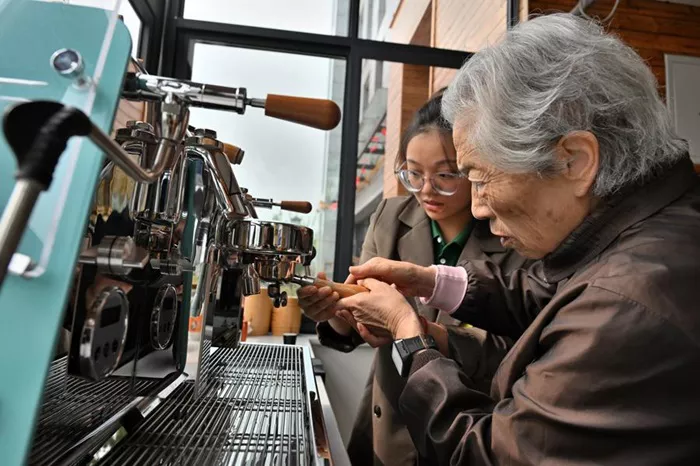At the “Unforgettable Cafe,” 84-year-old barista Dai Xiuyu hands a freshly brewed cup of coffee to a customer, guided by social worker Xiao Ling. Despite having practiced the process numerous times, Dai quickly forgets the steps she just completed.
This innovative cafe is situated in an elderly care community within Chengdu’s Bailianchi Sub-District, recognized as the first dementia-friendly sub-district in southwest China’s Sichuan Province. The cafe employs a team of young social workers and elderly individuals with cognitive impairments, creating a supportive environment.
On a good day, the elderly staff can prepare a dozen cups of coffee, but each cup feels like a new experience. The baristas depend on social workers to guide them through the entire coffee-making process.
Promoting Social Engagement and Skill Development
Beyond honing their cognitive skills through coffee preparation, social workers often take the elderly outside to sell coffee on the street, priced at just 9.9 yuan (approximately 1.4 U.S. dollars).
“Although it is not a profitable venture, this process helps the elderly reconnect with society and feel ‘needed,'” said Su Youcheng, founder of the Ai’en elderly care nursing home and president of the Chengdu Life Care Association.
During the initial planning of the Ai’en elderly care nursing home in 2022, Su designated a small 10-square-meter corner for the cafe. Despite its size, the cafe is fully equipped to serve a range of freshly brewed coffees, including Americano and latte.
“It serves as a bridge for intergenerational interaction between elderly individuals with dementia and young consumers, helping them maintain a positive mindset and potentially slow the progression of their disease,” Su explained.
Fostering Self-Worth Through Positive Reinforcement
While preparing coffee, the elderly workers receive continuous encouragement and praise from the social workers. Recognized by customers, they experience joy and a renewed sense of self-worth. Su noted that this non-pharmaceutical approach has significantly improved their mood, alleviating feelings of anxiety, irritability, and restlessness.
A study published by the Beijing-based Xuanwu Hospital, affiliated with Capital Medical University in the Lancet, reveals that approximately 38.77 million individuals aged 60 and above in China suffer from mild cognitive impairment, with 9.83 million diagnosed with Alzheimer’s disease. The prevalence of cognitive disorders is notably higher in western regions of China.
Despite differing symptoms, all patients with cognitive impairments share similar physical and emotional needs, including respect, love, and a sense of self-worth, according to Su.
Personal Stories of Resilience
Dai, who struggles with severe cognitive impairment, previously experienced frequent disorientation and demanded daily trips to the bank. If her family refused, she would become angry, sometimes resorting to violence.
After her admission to the nursing home, social workers discovered that Dai thrived on praise and affirmation. Compliments about her appearance or intelligence would instantly uplift her spirits, even during difficult moments.
Another resident, a 76-year-old man surnamed Gao, was once adept in mathematics. However, as he aged, he began to make errors in calculations and struggled with comprehension. After being diagnosed with dementia, Gao found joy in selling coffee at the Unforgettable Cafe, with each sale bringing him happiness for hours.
“The coffee shop serves as both a non-pharmaceutical intervention tool and a platform for raising public awareness about dementia,” Su stated. “Our aim is to ensure that these elderly individuals live with dignity and a high quality of life.”
A Growing Network of Support
Thanks to the elderly care services in Bailianchi Sub-District, all five local communities are now equipped with systems for early prevention, timely intervention, and professional care for dementia patients and other elderly individuals unable to care for themselves.
In 2023, the Chengdu Civil Affairs Bureau initiated the development of dementia-friendly communities as part of its public service project. This initiative aims to educate more elderly individuals on dementia prevention while offering non-pharmaceutical intervention training and family support activities for those already affected.
Currently, there are 56 dementia-friendly communities across Chengdu, the provincial capital. The Ai’en elderly care nursing home, which supports over 30 dementia patients with an average age of 70, has integrated the Unforgettable Cafe as a central feature of this initiative.
In this cozy cafe, although the elderly baristas may take their time crafting coffee, occasionally misreporting prices or forgetting steps, there is no impatience from those around them. The simple yet profound act of making coffee, coupled with the joy and sense of accomplishment it brings, transforms their daily routine into a powerful tool against forgetfulness.
Related Topics:
Coffee and Wrestling Unite: Exclusive Merch Bundle Launches
Cooks Coffee Welcomes Katherine Scott as New CFO to Fuel Growth
M&S Takes Aim at Pret: Revamped Cafes to Attract Lunchtime Crowd


